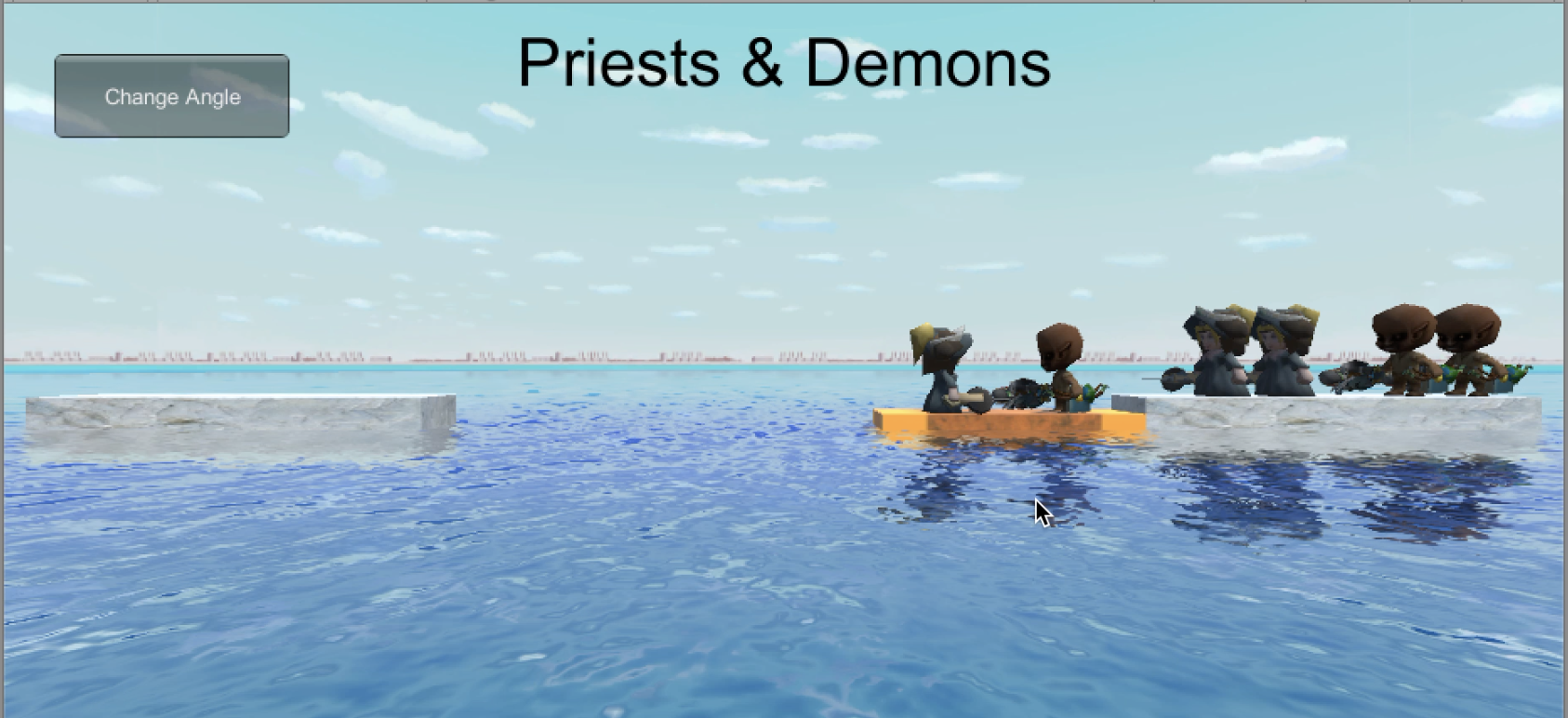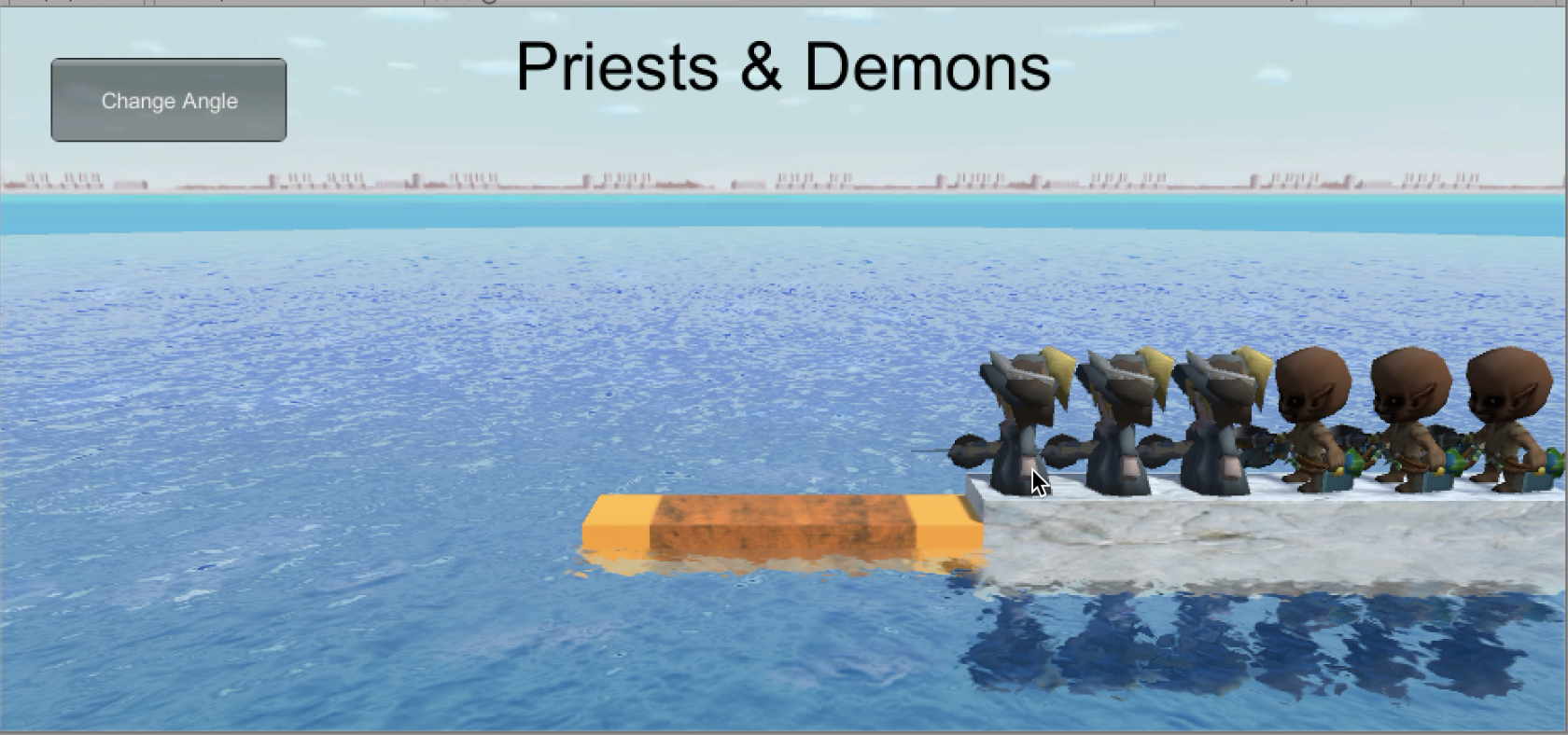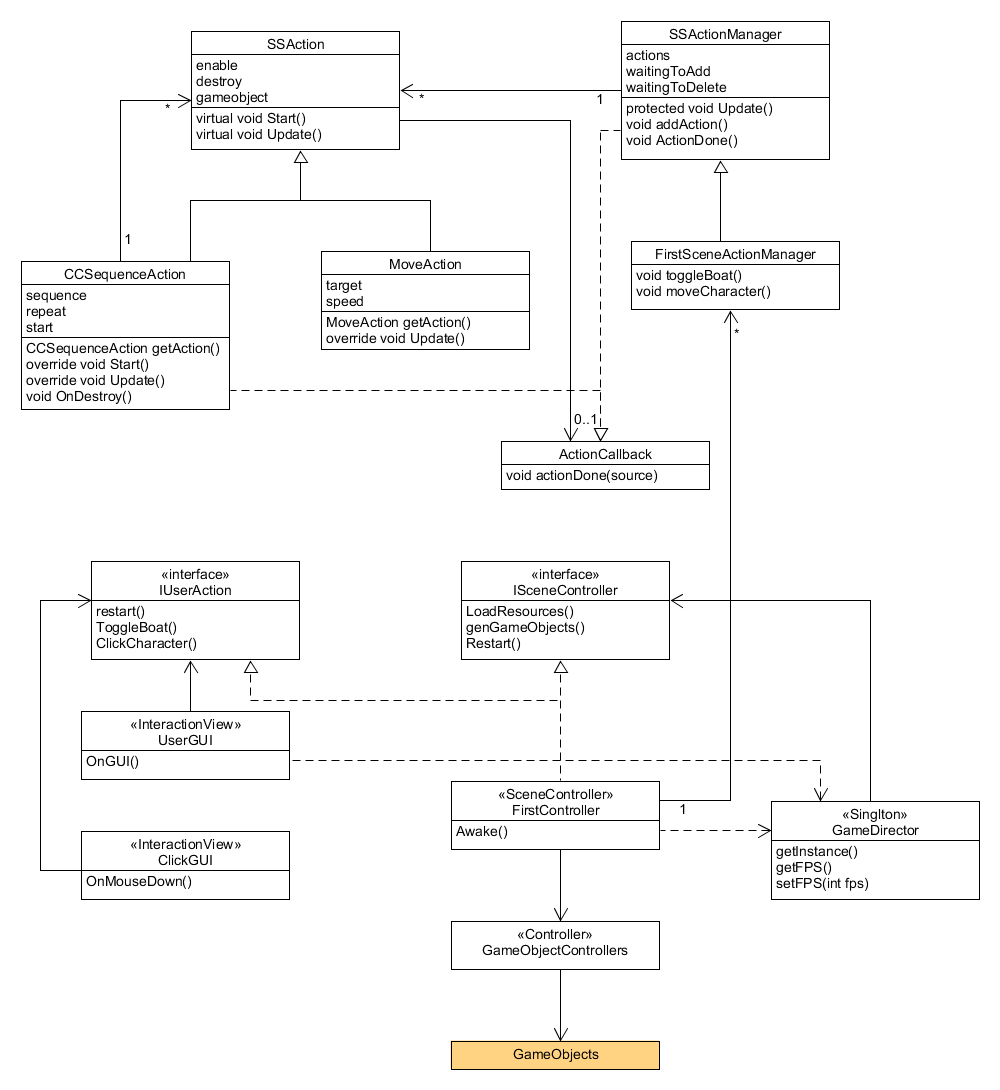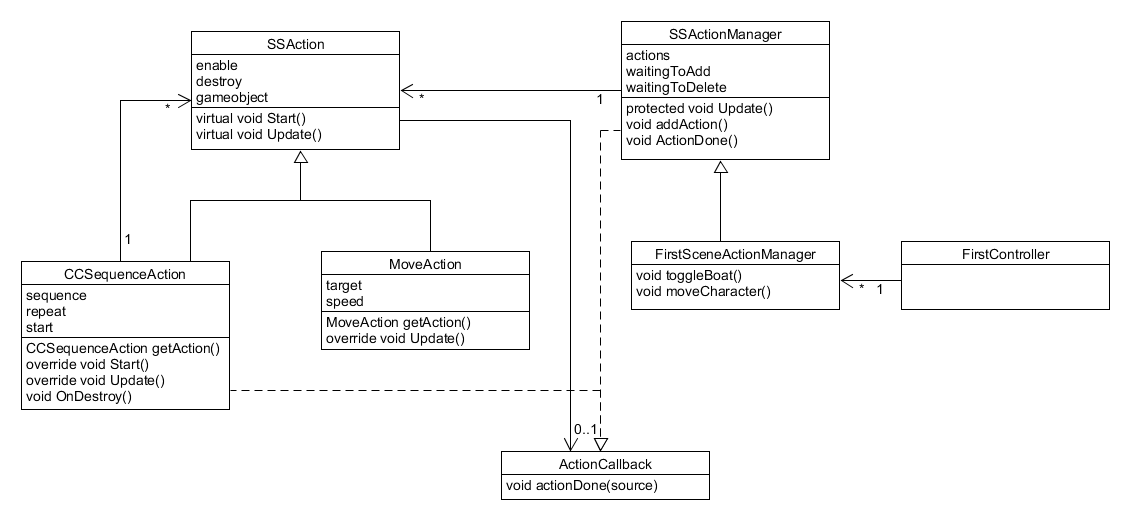Homework3编程实践
牧师与魔鬼 动作分离版
在上一周的编程实践中,我们已经完成了一个具有MVC架构的牧师与魔鬼的版本,而我们这周的任务就是实现一个动作管理器,把我们上周写在GameObjectController和SceneController里的对于GameObject动作的处理写出来,通过一个SceneActionManager的实例来管理,让其专门负责GameObject的动作。下面我们来谈谈动作管理器。
除了加入动作管理器外的改进
- 根据上课学到的内容,给Camera加上了SkyBox,美化了程序的UI
- 给游戏添加了切换视角的功能,玩家可以根据自己喜好在全局视角以及船只跟随视角之间任意切换,游戏的体验更佳
游戏效果


建立动作管理器
建立动作管理器的意义
在上一个版本的简单的牧师与恶魔的游戏中,我为了避免FirstSceneController中对于物体移动操作的代码量过多,把物体的动作封装在GameObjectController里面,通过这种做法,FirstSceneController的代码量的确得到了一定的减少,但是这样的话我每写一个GameObjectController我就要多写一个物体运动的函数,一旦需要移动的GameObject多起来,可能冗余的代码量就会大量增多了,而且一旦我们需要修改Move,我们可能就每一个类都要进行修改了,显然这对于开发者非常不友好。
这个时候,动作管理器的意义就体现出来了,就以我们这次的作业为例子,Move的一类的动作抽象成一个动作类MoveAction,然后通过ActionManager对其进行管理。我们在需要物体进行移动时,只需要新建一个MoveAction,调用ActionManaer的addAction,把具体的参数传给它,ActionManager就会执行我们的动作,我们再也不用将Move这类的动作一个一个写在我们的GameObjController中,大大减少了我们的代码量,大大提高了我们代码的复用性,一旦动作方面的需求修改,我们也只需要修改该Action类的内容,以及相关调用创建该Action的地方,更加利于我们的维护以及让程序更能适应需求变化。
在了解了动作管理器的意义之后,我们就可以开始我们动作管理器的编写了,我们先画一个动作管理器的UML图理清一下思路
 然后与上一节课的UML图结合起来变成整个程序的UML图,画出来UML图之后,我们程序的架构就很清晰了。
然后与上一节课的UML图结合起来变成整个程序的UML图,画出来UML图之后,我们程序的架构就很清晰了。

下面我们分类进行描述
ActionCallBack
这个方法主要是提供一个让动作完成时调用的接口,一旦动作完成,该接口对应实现的方法就会被调用,动作管理器可以对动作的完成进行响应。
public interface ActionCallback { void actionDone (SSAction source); }
SSAction
SSAction这个类就是所有动作对象类抽象出来的一个不需要绑定 GameObject 对象的可编程基类,其动作的实现由其子类实现Update中的内容实现,这个在后面的MoveAction就有体现,所有的SSAction对象受ActionManager管理。
public class SSAction : ScriptableObject { public bool enable = true; public bool destroy = false; public GameObject gameObject; public Transform transform; public ActionCallback callback; public virtual void Start() { throw new System.NotImplementedException(); } public virtual void Update() { throw new System.NotImplementedException(); } }
MoveAction
MoveAction就是上面SSAction的一个子类,它的作用就是根据用户所提供的目的地和速度,使得物体完成一定速度的向某一目的地的直线运动。其通过Update的实现来完成逐帧的对于物体位置的变动,实现一个所谓的物体的"动作"。
public class MoveAction : SSAction { public Vector3 target; public float speed; private MoveAction(){ } public static MoveAction getAction(Vector3 target, float speed) { MoveAction action = ScriptableObject.CreateInstance<MoveAction> (); action.target = target; action.speed = speed; return action; } // Use this for initialization public override void Start () { } // Update is called once per frame public override void Update () { transform.position = Vector3.MoveTowards(transform.position, target, speed*Time.deltaTime); if (transform.transform.position == target) { destroy = true; callback.actionDone (this); } } }
CCSequenceAction
这是一个动作顺序执行序列的是SSAction的子类,其通过一个Action的List,和actionDone对于List的维护以及Update对于调用哪个Action的Update方法的控制,实现了一个动作顺序执行的效果。十分方便了我们对于一个连续动作的编程。
public class CCSequenceAction : SSAction, ActionCallback { public List<SSAction> sequence; public int repeat = 1; // 1->only do it for once, -1->repeat forever public int currentActionIndex = 0; public static CCSequenceAction getAction(int repeat, int currentActionIndex, List<SSAction> sequence) { CCSequenceAction action = ScriptableObject.CreateInstance<CCSequenceAction>(); action.sequence = sequence; action.repeat = repeat; action.currentActionIndex = currentActionIndex; return action; } public override void Update() { if (sequence.Count == 0)return; if (currentActionIndex < sequence.Count) { sequence[currentActionIndex].Update(); } } public void actionDone(SSAction source) { source.destroy = false; this.currentActionIndex++; if (this.currentActionIndex >= sequence.Count) { this.currentActionIndex = 0; if (repeat > 0) repeat--; if (repeat == 0) { this.destroy = true; this.callback.actionDone(this); } } } public override void Start() { foreach(SSAction action in sequence) { action.gameObject = this.gameObject; action.transform = this.transform; action.callback = this; action.Start(); } } void OnDestroy() { foreach(SSAction action in sequence) { DestroyObject(action); } } }
SSActionManager
这个就是我们这一期的主角ActionManager了,其负责了action的增加、删除、执行。它通过在Update中调用SSAction的Update方法,实现对于动作的一个调度,管理动作的自动执行。
public class SSActionManager : MonoBehaviour, ActionCallback { private Dictionary<int, SSAction> actions = new Dictionary<int, SSAction>(); private List<SSAction> waitingToAdd = new List<SSAction>(); private List<int> watingToDelete = new List<int>(); protected void Update() { foreach(SSAction ac in waitingToAdd) { actions[ac.GetInstanceID()] = ac; } waitingToAdd.Clear(); foreach(KeyValuePair<int, SSAction> kv in actions) { SSAction ac = kv.Value; if (ac.destroy) { watingToDelete.Add(ac.GetInstanceID()); } else if (ac.enable) { ac.Update(); } } foreach(int key in watingToDelete) { SSAction ac = actions[key]; actions.Remove(key); DestroyObject(ac); } watingToDelete.Clear(); } public void addAction(GameObject gameObject, SSAction action, ActionCallback callback) { action.gameObject = gameObject; action.transform = gameObject.transform; action.callback = callback; waitingToAdd.Add(action); action.Start(); } public void actionDone(SSAction source) { } }
FirstSceneActionManager
FirstSceneActionManager就是我们上面SSActionManager的一个子类,对于我们场景中具体的动作进行了封装,我们只需要在FirstSceneController中调用该方法,就可以实现我们之前的Move了,十分方便了我们的编程。
public class FirstSceneActionManager : SSActionManager { public void toggleBoat(BoatController boat) { MoveAction action = MoveAction.getAction (boat.getTarget (), boat.speed); this.addAction (boat.getBoat (), action, this); boat.toggle (); } public void moveCharacter(ICharacterController character, Vector3 target) { Vector3 nowPos = character.getPos (); Vector3 tmpPos = nowPos; if (target.y > nowPos.y) { tmpPos.y = target.y; } else { tmpPos.x = target.x; } SSAction action1 = MoveAction.getAction(tmpPos, character.speed); SSAction action2 = MoveAction.getAction(target, character.speed); SSAction sequenceAction = CCSequenceAction.getAction(1, 0, new List<SSAction>{action1, action2}); this.addAction(character.getInstance(), sequenceAction, this); } }
FirstController
在完成了FirstSceneActionManager后,我们把GameObjectController中以及FirstController中一些关于动作的部分删除,然后在原来动作的部分调用FirstSceneActionManager提供新的方法就可以了。(不过因为一开始设计架构的时候没有考虑加入动作管理器,加之最近时间较紧,没有太多时间对游戏进行重构,所以FirstController中仍然有着部分关于判断物体运动的逻辑)
public class FirstController : MonoBehaviour, ISceneController, IUserAction { UserGUI userGUI; public LandController rightLand; public LandController leftLand; public BoatController boat; public ICharacterController[] characters; private FirstSceneActionManager actionManager; void Awake() { GameDirector director = GameDirector.getInstance(); director.currentSceneController = this; userGUI = gameObject.AddComponent<UserGUI>() as UserGUI; genGameObjects(); } void Start() { actionManager = GetComponent<FirstSceneActionManager> (); } public void genGameObjects() { characters = new ICharacterController[6]; boat = new BoatController(); leftLand = new LandController(-1); rightLand = new LandController(1); for (int i = 0; i < 3; i++) { ICharacterController priest = new ICharacterController(0, "priest" + i); priest.setPosition(rightLand.getEmptyPosition()); priest.getOnLand(rightLand); rightLand.getOnLand(priest); characters[i] = priest; } for (int i = 0; i < 3; i++) { ICharacterController demon = new ICharacterController(1, "demon" + i); demon.setPosition(rightLand.getEmptyPosition()); demon.getOnLand(rightLand); rightLand.getOnLand(demon); characters[i+3] = demon; } } public void ClickCharacter(ICharacterController character) { if (userGUI.status != 0 || !boat.available()) { return; } if (character.isOnBoat()) { LandController land; if (boat.getBoatPos() == 0) { land = leftLand; } else { land = rightLand; } boat.getOffBoat(character.getName()); actionManager.moveCharacter (character, land.getEmptyPosition ()); character.getOnLand(land); land.getOnLand(character); } else { LandController land = character.getLandController(); if (boat.getEmptyIndex() == -1) return; int landPos = land.getType(), boatPos = (boat.getBoatPos() == 0) ? -1 : 1; if (landPos != boatPos) return; land.getOffLand(character.getName()); actionManager.moveCharacter (character, boat.getEmptyPosition ()); character.getOnBoat(boat, boat.getEmptyIndex()); boat.getOnBoat(character); } userGUI.status = checkResult(); } public void ToggleBoat() { if (userGUI.status != 0 || boat.isEmpty() || !boat.available()) return; actionManager.toggleBoat (boat); userGUI.status = checkResult(); } int checkResult() { int leftPriests = 0; int rightPriests = 0; int leftDemons = 0; int rightDemons = 0; int[] leftStatus = leftLand.getStatus(); leftPriests += leftStatus[0]; leftDemons += leftStatus[1]; if (leftPriests + leftDemons == 6) return 2; int[] rightStatus = rightLand.getStatus(); rightPriests += rightStatus[0]; rightDemons += rightStatus[1]; int[] boatStatus = boat.getBoatStatus(); if (boat.getBoatPos() == 0) { leftPriests += boatStatus[0]; leftDemons += boatStatus[1]; } else { rightPriests += boatStatus[0]; rightDemons += boatStatus[1]; } if (leftPriests > 0 && leftPriests < leftDemons) return 1; if (rightPriests > 0 && rightPriests < rightDemons) return 1; return 0; } public void restart() { boat.reset(); leftLand.reset(); rightLand.reset(); for (int i = 0; i < characters.Length; i++) characters[i].reset(); } }
到这里,这周的作业就完成啦,不说了,先去肝现操了(逃🌚
感谢阅读我的博客!😋